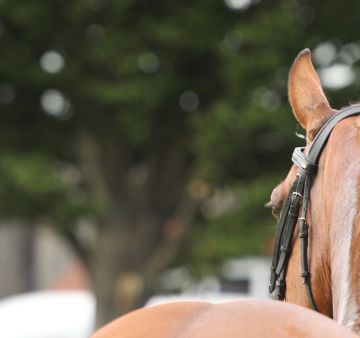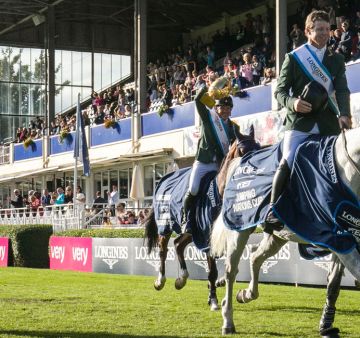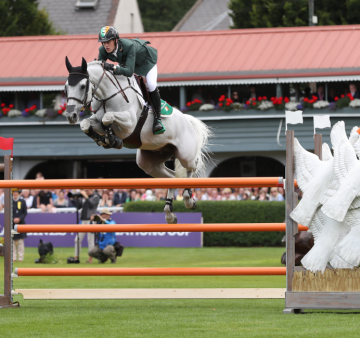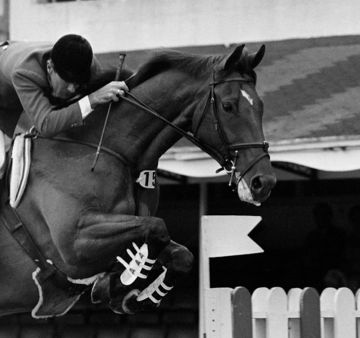The RDS is fully committed to compliance with both the letter and the spirit of:
- The Safety, Health and Welfare at Work Act 2005
- The Protection of Animals Acts 1911, 1965, 1994, the Animal Welfare Act 2006 and the Animal Health and Welfare Act 2013
and all the regulations stemming from these acts.
1. The RDS accepts the FEI Code of Conduct and expects all those involved in equestrian sport to acknowledge and accept that at all times the welfare of the horse must be paramount and must never be subordinated to competitors’ or commercial pressures.
- At all stages during the preparation and training of competition horses, welfare must take precedence over all other demands; this implies the highest standards in horse management, training methods, farriery, tack use and transportation.
- Horses and competitors must be fit, competent and in good health before they are allowed to compete at the Dublin Horse Show. This includes medication and / or surgical procedures which might compromise welfare or safety. Mares over 120 days pregnant must not be competed with the exception of in-hand showing classes. The inappropriate use of natural or artificial aids is not tolerated.
- The RDS affirms that equestrian events must not prejudice horse welfare. Attention must focus on arenas, ground surfaces, weather conditions, stabling, site safety and the fitness of the horse for competition.
- It is the responsibility of the owner / exhibitor to ensure that horses receive proper attention during their participation at the Dublin Horse Show. This embraces skilful equitation, effective equine husbandry, proper veterinary intervention, and adequate care at all times.
- The RDS along with the FEI encourages all involved in equestrian sport to acquire the highest level of competence in their respective areas of expertise.
In deference to this Code of Conduct, all equestrian performance at the Dublin Horse Show aspires to reflect best practice in the ethical training of all horses which compete on its Showgrounds.
Accordingly:
At the Royal Dublin Society Showgrounds, all horses in stables, at practice, in warm-up and competition must exhibit positive and social behaviour that is the consequence of:
- Freedom from hunger and thirst
- Freedom from discomfort
- Freedom from pain, injury and disease
- Freedom to express normal behaviour
- Freedom from fear and distress
It is necessary:
That the horse exhibits a quality of posture and performance that accurately reflects a systematic programme of training, appropriate to its age and peer standard in order that it may ultimately demonstrate its genetic potential.
The criteria by which classical training is measured:
- Rhythm
- Relaxation (Suppleness)
- Contact
- Impulsion
- Straightness
- Collection (Engagement)
Within these parameters, harmony in horsemanship and excellence in equestrian sport is best achieved.
2. The RDS is committed to making every reasonable effort to avoid and prevent accidents and to protect the welfare of all animals and persons on the Showgrounds.
- The RDS applies a zero-tolerance policy to any evidential transgressions of animal welfare standards.
- Owners must accept primary responsibility for the welfare of their own stock and the health and safety of themselves and those nearby.
- The RDS has a management structure in place which ensures that responsibility for animal welfare, health and safety is allocated and carried out at an appropriate level throughout the Showgrounds for the duration of the Dublin Horse Show.
- While many of those entrusted with stewarding duties are volunteers, this in no way diminishes their individual or collective responsibilities, or that of the Royal Dublin Society in support of them.
- All those who work, with or among horses, should appreciate the implicit risks involved and exercise a duty to act with due consideration for the welfare, health and safety of all. They must report any potentially unsafe situation, dangerous activity or accident immediately to the Chief Steward and, where possible and appropriate, react to reduce or remedy the attendant risk.
- The RDS has appointed a Chief Safety Steward who reports directly to the Show Director.
- All stables, exercise areas and competition arenas will be under surveillance from time to time to monitor that the RDS commitment to animal welfare is adhered to.




